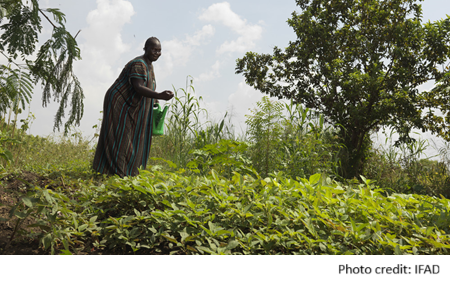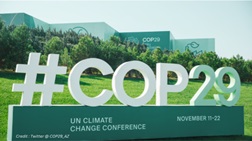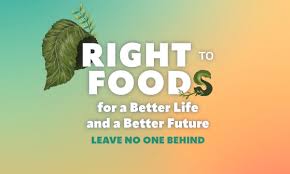Tremendous politicized hype and disinformation have been hitting the airwaves and social media lately around Canada's climate policies and, in particular, carbon pricing. Climate policies have nothing to do with the economic hardships Canadians are facing, yet some Canadian politicians are ignoring the real causes of the cost of living crisis and scapegoating carbon pricing to score political points. It is so important that these "bad faith" attacks on carbon pricing be countered with correct information, and that stronger action be taken to address the cost of living concerns of Canadians. Climate Action Network has issued a statement correcting the disinformation and suggesting policies that will tackle the climate and affordability crises simultaneously. GRAN has signed on to the statement. To read it, click here. Please consider sharing it broadly with your networks.
“To support women’s health, we need to protect women’s rights. And to protect women’s rights we need to support the women frontline defenders of these rights.” -- Winnie Byanyima, UNAIDS Executive Director
UNAIDS’ call this International Women’s Day is to protect women’s and girls’ health and to protect women’s and girls’ rights. In doing so, the world will end AIDS, and will overcome the inequalities driving it.
Click here to read UNAIDS’ statement for International Women’s Day and do not miss the hard-hitting and inspiring 5-minute video message from UNAIDS Executive Director Winnie Byanyima provided at the end of the statement.
“Meeting after meeting, resolution after resolution, this body has failed to effectively address this conflict. We have watched members of this Council deliberate and delay while civilians die. This death, destruction, and forced displacement are the result of military and political choices that blatantly disregard civilian lives. These choices could have been—and still can be—made very differently.” – Christopher Lockyear, Secretary General MSF
In a searing address to the UN Security Council yesterday, Christopher Lockyear, Secretary General of Doctors Without Borders/Médecins Sans Frontières (MSF), called for an immediate and sustained ceasefire in Gaza and the protection of medical facilities, staff, and patients.
“We demand the protections promised under humanitarian law.
We demand a ceasefire from both parties.
We demand the space to turn the illusion of aid to meaningful assistance.
What will you do to make this happen?”
Click here to read more and to listen to Lockyear’s impassioned address.
“This week, we celebrate the people and organizations advancing the UN Sustainable Development Goals (SDGs). Guided by their compassion and belief in a better world, they are catalyzing positive change at home and abroad. " -- Canada's Minister of International Development, Ahmed Hussen
Click here to read the Minister's full statement for International Development Week (IDW).
And here to go to GRAN's Learning Events page to check out some of the IDW events you can take part in this week.
“Having an inclusive policy environment is one of the first steps to ensuring refugees have access to the same learning opportunities as host country
nationals.” – Global Partnership for Education
Currently, more than half of the world’s 15.5 million refugee children are not in school.
The Global Partnership for Education (GPE) is the world’s largest partnership solely dedicated to transforming education systems. The GPE supports refugee-hosting countries to help strengthen their capacity and resources to ensure a quality education is available for all, including the children living as refugees within their borders.
Click here to find out how the countries of South Sudan, Djibouti, and Ethiopia are focusing on supporting the education needs of refugees.
A recent photo series by Maasai photographers Claire Metito and Irene Naneu chronicles the growing care burden facing pastoralist women in Kenya who are on the frontline of the climate crisis. Visual storytelling is a powerful tool for their community, which faces marginalisation and illiteracy, and a way to disrupt the barriers that often keep their realities and perspectives from full view. Capturing the everyday experiences of two older women, the photographers provide an intimate view of the increased, and often undervalued, domestic load that they are shouldering to secure food, water, and fuel for their families.
“Getting behind the camera and hearing how people are being affected, that’s when I truly understood the extent of the situation we are facing with climate change.” – Irene Naneu
Click here to view Claire Metito’s and Irene Naneu’s images and to learn more about the daily lives of the women they have photographed.
And click here to learn about the non-profit organization Lensational, whose mission is to equip women from underrepresented groups and communities with cameras and photography training so they can express themselves and represent themselves with dignity.
Cause for celebration! A global coalition of Civil Society Organizations, of which GRAN was a part, has won the prestigious 2023 United Nations Human Rights Prize. It is an honorary award given out every five years to individuals and organizations in recognition of outstanding achievement in human rights. The Prize is an opportunity not only to give public recognition to the achievements of the recipients themselves, but also to send a clear message of support to human rights defenders around the world. This year is the first time since its inception in 1966 that the award has been granted to a global coalition.
The Global Coalition of Civil Society, Indigenous Peoples, Social Movements, and Local Communities for the Universal Recognition of the Right to a Clean, Healthy, and Sustainable Environment accepted the Human Rights Prize in a ceremony in New York this past week. GRAN received a congratulatory note from the Coalition saying, "We are extremely grateful that you and your organization joined the coalition and supported its work. Congratulations to each of you and to Grandmothers Advocacy Network (GRAN)!"
Click here to read the full press release on this prestigious award, and here to read the Coalition's global call for the Right to a safe, clean, healthy and sustainable environment.
We invite you to celebrate with us the power of partnerships. Congratulations, GRANs!
The 2030 Agenda for Sustainable Development was adopted by all United Nations Member States in 2015, and provides a shared blueprint for peace and prosperity for people and the planet. At its heart are the 17 Sustainable Development Goals (SDGs), which are an urgent call for action by all countries in global partnership. The goals recognize that ending poverty and other deprivations must go hand-in-hand with strategies that improve health and education, reduce inequality, and spur economic growth – all while tackling climate change and working to preserve our oceans and forests. With only 15% of the Global Goals on track to be achieved by 2030, the UN is highlighting some of the proudest achievements of 2023 to show what is possible with the right resources, solutions, and determination. There is still time to turn things around and make the changes the world urgently needs.
You can read the Sustainable Development Goals year in review here.
The Elders have welcomed the signal from COP28 that the fossil fuel era must end. But they say that the actions agreed in Dubai are too little, too late. World leaders need more urgent ambition in addressing the existential threat of the climate crisis and supporting the most vulnerable. Click here to read the full statement from The Elders.
In a groundbreaking experiment in alleviating global poverty, for the past six years the U.S.- based charity GiveDirectly has been providing thousands of villagers in Kenya with a "universal basic income", delivered every month, with the commitment to keep the payments coming for 12 years. The charity has expanded the program and is currently running basic income programs in some of the poorest parts of Kenya, Malawi, Mozambique, and Liberia. Every eligible adult in a target region receives a monthly cash transfer specifically sized to lift them above the local extreme poverty line, usually between $30 and $60. This money is not a loan, but cash with no strings attached. Giving money so that people can choose how to use it recognizes that, within a community, every person has different needs. It enables families to buy what they need and have a consistent source of income, allowing them to invest in themselves and their children. To hear directly from those benefiting from the program, watch this 3-minute video and learn how seven families in a village in Malawi spend their basic income transfers.
A team of independent researchers has been studying the impacts of the Kenya project. This past week they released their preliminary results. Click here to learn more about the project, considered the world's largest and longest study on Universal Basic Income, and click here to read a summary of the early findings.
Pages


